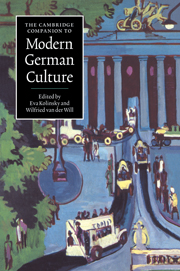Book contents
- Frontmatter
- In search of German culture: an introduction
- 1 The citizen and the state in modern Germany
- 2 German national identity
- 3 Elites and class structure
- 4 Jews in German society
- 5 Non-German minorities, women and the emergence of civil society
- 6 Critiques of culture
- 7 The functions of 'Volkskultur', mass culture and alternative culture
- 8 The development of German prose fiction
- 9 Modern German poetry
- 10 German drama, theatre and dance
- 11 Music in modern German culture
- 12 Modern German art
- 13 Modern German architecture
- 14 German cinema
- 15 The media of mass communication: the press, radio and television
- Index
1 - The citizen and the state in modern Germany
Published online by Cambridge University Press: 28 May 2006
- Frontmatter
- In search of German culture: an introduction
- 1 The citizen and the state in modern Germany
- 2 German national identity
- 3 Elites and class structure
- 4 Jews in German society
- 5 Non-German minorities, women and the emergence of civil society
- 6 Critiques of culture
- 7 The functions of 'Volkskultur', mass culture and alternative culture
- 8 The development of German prose fiction
- 9 Modern German poetry
- 10 German drama, theatre and dance
- 11 Music in modern German culture
- 12 Modern German art
- 13 Modern German architecture
- 14 German cinema
- 15 The media of mass communication: the press, radio and television
- Index
Summary
Since 1871 Germany has had five different constitutions and six different forms of the state - monarchical and republican, democratic and dictatorial, federal and unitary, divided and unified. There are no countries where the exercise of political authority and the perception of civil rights derive solely from the letter of the law or the structure of institutions; they depend as much on mentalities, traditions and conventions. It is difficult enough to maintain a consensus on such matters in countries with stable constitutional systems, like Britain or the United States. It is therefore hardly surprising that the roles of the state and the citizen and the rival claims of order and liberty are subject to dispute and misunderstanding in a country like Germany, with its broken constitutional history.
Imperial Germany, 1871-1918
The Empire that was proclaimed in the Hall of Mirrors at Versailles on 18 January 1871 was the first approximation to a nation state in German history. Yet it had come into being not through popular acclamation or plebiscite, but through Prussian military victories. It was a nation state in that the great majority of the German-speakers of Europe were included in it; except for a Polish minority in the East and smaller Danish and French minorities in the North and the West, its population was homogeneously German. But the people had played little part in its creation, except as conscript soldiers.
- Type
- Chapter
- Information
- The Cambridge Companion to Modern German Culture , pp. 20 - 43Publisher: Cambridge University PressPrint publication year: 1999

